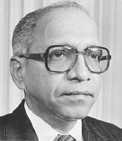Financial Times' tribute to Devan Nair
 SINGAPORE'S political leaders and state-guided media have been lavish in their praise for Devan Nair, the city-state's former president and trade union leader, who died this week at age 82.
SINGAPORE'S political leaders and state-guided media have been lavish in their praise for Devan Nair, the city-state's former president and trade union leader, who died this week at age 82.That would not be unusual except for the fact that Nair was living in exile in Canada after a very public falling out 20 years ago with Lee Kuan Yew, the founding father of modern Singapore.
Nair became one of Mr Lee's bitterest critics, saying that he had created a repressive regime. He also accused Mr Lee of being an elitist whose views linking genetics with intelligence were demeaning to Singapore's ethnic Indian and Malay minorities.
None of those remarks appeared in this week's media coverage, which focused instead on Nair's beginnings as a communist agitator who campaigned against British colonialism and was imprisoned before he switched his support to the People's Action party, which has ruled Singapore since 1959.
Nair was instrumental in taming the labour unions by creating a partnership between the government and the dominant National Trade Union Congress he headed, which served as a hallmark of Singapore's corporatist model. He later regretted his role, saying the trade unions were "no longer free".
Historians welcomed the extensive media attention on Nair because it highlighted the role that others besides Mr Lee played in creating an independent Singapore.
Singapore newspapers, which have rarely mentioned Nair in recent years, have now published comments citing him as a role model. "Nair went to jail believing what he was doing was right. How many of us are willing to do that for what we believe in?" asked one columnist.
Appointed to the largely ceremonial post of president in 1981, his feud with Mr Lee came to a head three years later when he suddenly resigned.
Mr Lee said Nair quit to get treatment for alcoholism. Nair said he was forced to resign because his questioning of Mr Lee's government had resulted in a clash between the two.
A former Nair aide said both versions were correct. Mr Nair began drinking heavily because "he felt trapped and frustrated" as president. "But Nair was also seen by Lee as potential source of opposition to his rule."
The resignation led to an ugly public debate between Nair and Mr Lee that lasted for years. As late as 2001, the two were engaged in rival libel suits over the incident.
Nair's death has led to calls that he should be given a state funeral, an honour that has been bestowed on several other deceased presidents. That places Singapore's prime minister, the son of Mr Lee, in an awkward position since he must decide on the issue.
While the prime minister has issued a public letter of condolence marking Nair's passing, a similar gesture by Mr Lee has been noticeable by its absence.
(by John Burton in Singapore for London's Financial Times; published on December 10, 2005)


<< Home